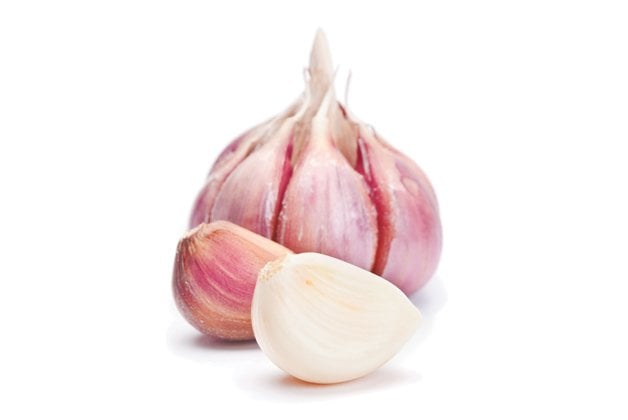
They don’t call it the stinking rose for nothing. Still, many celebrate the magical benefits of garlic, and the claims are astounding. It fights cancer! Lowers cholesterol! Protects against heart disease! Look! Up in the sky! It’s superfo-o-od!
Makes you wonder, though, if all the promises aren’t a wee bit exaggerated.
Can garlic really do all these things? And must we all walk around smelling to high heaven in order to save our lives?
What the experts say
“Our study involved 200 people and included supplements as well as raw garlic. We made gourmet sandwiches, and subjects got one plus a garlic pill six days a week over six months. Some of the pills were placebos, and some of the sandwiches didn’t have garlic. The subjects were not on cholesterol-lowering drugs and had modestly elevated LDL cholesterol. Absolutely no effect was observed, not even a hint of a trend. We published an entire paper just on the process of peeling the garlic, extracting it, freezing it, measuring it to make sure the active ingredients were there. We also measured them in the pills. Almost all studies are done with supplements, in which the active ingredient in garlic is often inactivated. Is this any reason not to eat hummus and veggie stir-fries flavoured with garlic? No.”
CHRIS GARDNER
professor of medicine, Stanford Prevention Research Center,
Stanford, California
“Eating raw garlic regularly may prevent lung cancer by reducing the harmful effects of smoking. Raw garlic can be integrated into the usual diet – the more the better. Still, to prevent lung cancer, living a healthy life remains the fundamental measure.”
JIN-KOU ZHAO
Jiangsu Provincial Center for Disease Control and Prevention,
Nanjing, China
“I have investigated an aged garlic extract that can be purchased as a dietary supplement. My research has shown that garlic is a strong antioxidant and mops up free radicals
involved in the aging process and implicated in chronic conditions such as cardiovascular disease. We found that smokers are under increased oxidative stress and hence more prone to cardiovascular disease. When we gave them our garlic daily, their oxidative stress levels decreased significantly. This form of garlic also inhibits platelet aggregation, which leaves people more likely to have strokes, thrombus and cardiovascular disease. Other researchers have also shown that garlic decreases serum cholesterol levels. The implication is that aged garlic extract may prevent or reduce cardiovascular disease and other chronic diseases associated with oxidative stress such as cancer.”
KHALID RAHMAN
professor of physiological biochemistry, pharmacy and biomolecular sciences,
Liverpool John Moores University, England
“Garlic is nature’s antibiotic. Naturopaths use it to boost the immune system and treat bacterial, viral, fungal and parasitic infections. The medicinal uses of garlic have been extensively researched, and aged garlic extract has been shown to reduce cholesterol, high blood pressure and the risk of cardiovascular disease. Despite the health benefits garlic offers, the smell of garlic cloves prevents its use in some kitchens. For this reason, supplementing with odourless garlic capsules is quite popular. In my practice, I recommend garlic capsules more than any other natural health product.”
SARA CELIK
naturopath, Toronto
“We found that drinking milk is more effective in deodorizing a persistent garlic odour (allyl methyl sulfide) than water. When you consume the milk makes a significant difference. After garlic ingestion, diallyl disulfide, a major garlic volatile in the mouth, is quickly metabolized by the liver and intestine into allyl methyl sulfide, which can last in the body and/or breath from several hours to days. This varies from person to person. If milk is consumed after garlic, it will have less chance to interact with diallyl disulfide than if added to garlic before ingestion. Since water and fat are the major components in milk that have this deodorizing effect, foods that are water-based with some fat, such as coconut milk, should have similar effects.”
AREERAT HANSANUGRUM
researcher, department of food science and technology,
Ohio State University, Columbus
Got a question?
Send your Althealth queries to althealth@nowtoronto.com












